The Cambridge History of China. Vol. 12: Republican China, 1912-1949, Part 1
Подождите немного. Документ загружается.

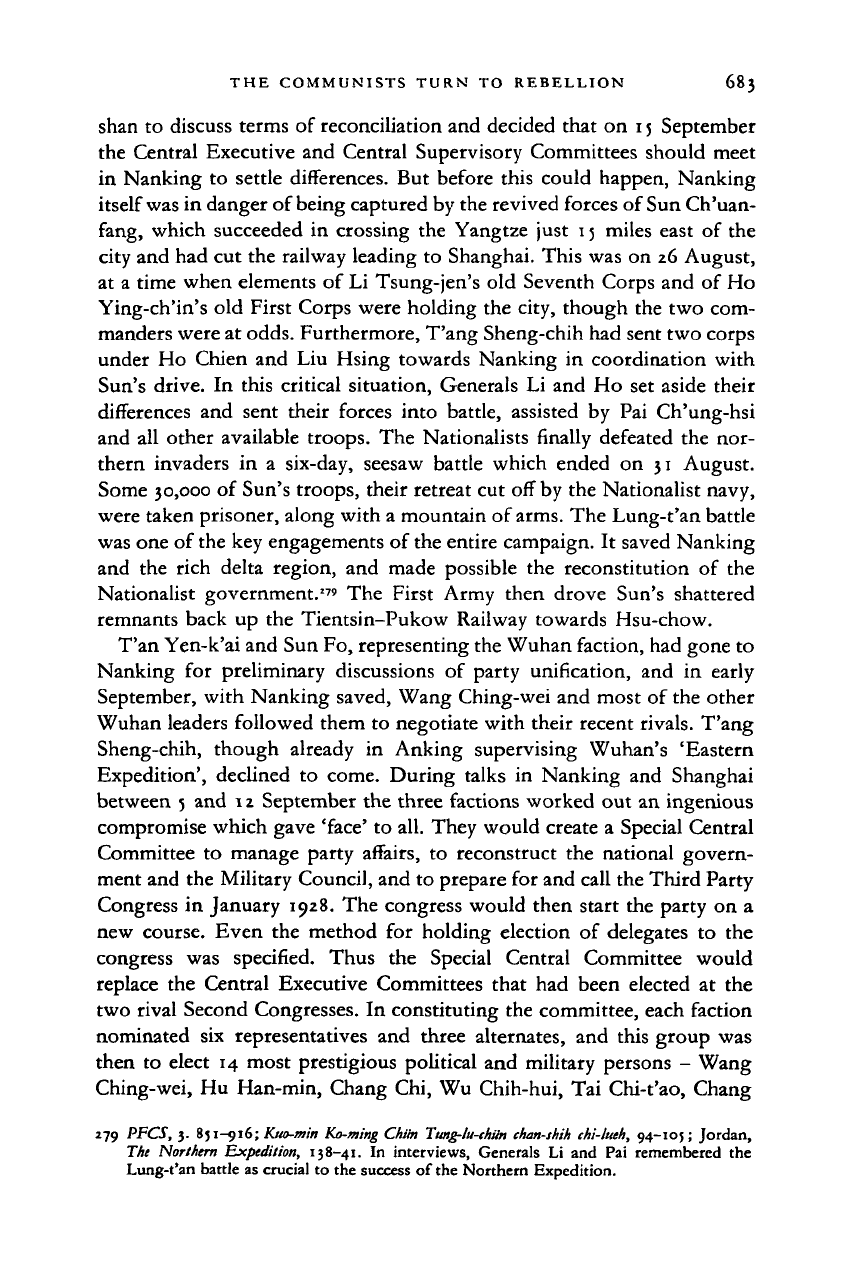
THE COMMUNISTS TURN TO REBELLION 683
shan to discuss terms of reconciliation and decided that on 15 September
the Central Executive and Central Supervisory Committees should meet
in Nanking to settle differences. But before this could happen, Nanking
itself was in danger of being captured by the revived forces of Sun Ch'uan-
fang, which succeeded in crossing the Yangtze just 15 miles east of the
city and had cut the railway leading to Shanghai. This was on 26 August,
at a time when elements of Li Tsung-jen's old Seventh Corps and of Ho
Ying-ch'in's old First Corps were holding the city, though the two com-
manders were at odds. Furthermore, T'ang Sheng-chih had sent two corps
under Ho Chien and Liu Hsing towards Nanking in coordination with
Sun's drive. In this critical situation, Generals Li and Ho set aside their
differences and sent their forces into battle, assisted by Pai Ch'ung-hsi
and all other available troops. The Nationalists finally defeated the nor-
thern invaders in a six-day, seesaw battle which ended on 31 August.
Some 30,000 of Sun's troops, their retreat cut off
by
the Nationalist navy,
were taken prisoner, along with a mountain of
arms.
The Lung-t'an battle
was one of the key engagements of the entire campaign. It saved Nanking
and the rich delta region, and made possible the reconstitution of the
Nationalist government.
279
The First Army then drove Sun's shattered
remnants back up the Tientsin-Pukow Railway towards Hsu-chow.
T'an Yen-k'ai and Sun Fo, representing the Wuhan faction, had gone to
Nanking for preliminary discussions of party unification, and in early
September, with Nanking saved, Wang Ching-wei and most of the other
Wuhan leaders followed them to negotiate with their recent rivals. T'ang
Sheng-chih, though already in Anking supervising Wuhan's 'Eastern
Expedition', declined to come. During talks in Nanking and Shanghai
between
5
and 12 September the three factions worked out an ingenious
compromise which gave 'face' to all. They would create a Special Central
Committee to manage party affairs, to reconstruct the national govern-
ment and the Military Council, and to prepare for and call the Third Party
Congress in January 1928. The congress would then start the party on a
new course. Even the method for holding election of delegates to the
congress was specified. Thus the Special Central Committee would
replace the Central Executive Committees that had been elected at the
two rival Second Congresses. In constituting the committee, each faction
nominated six representatives and three alternates, and this group was
then to elect 14 most prestigious political and military persons - Wang
Ching-wei, Hu Han-min, Chang Chi, Wu Chih-hui, Tai Chi-t'ao, Chang
279 PFCS, 3. 851-916;
Kuo-min Ko-mitig Chiin Tung-lu-chiin chan-shih
chi-lueh,
94-105; Jordan,
The Northern 'Expedition, 138-41. In interviews, Generals Li and Pai remembered the
Lung-t'an battle as crucial to the success of the Northern Expedition.
Cambridge Histories Online © Cambridge University Press, 2008
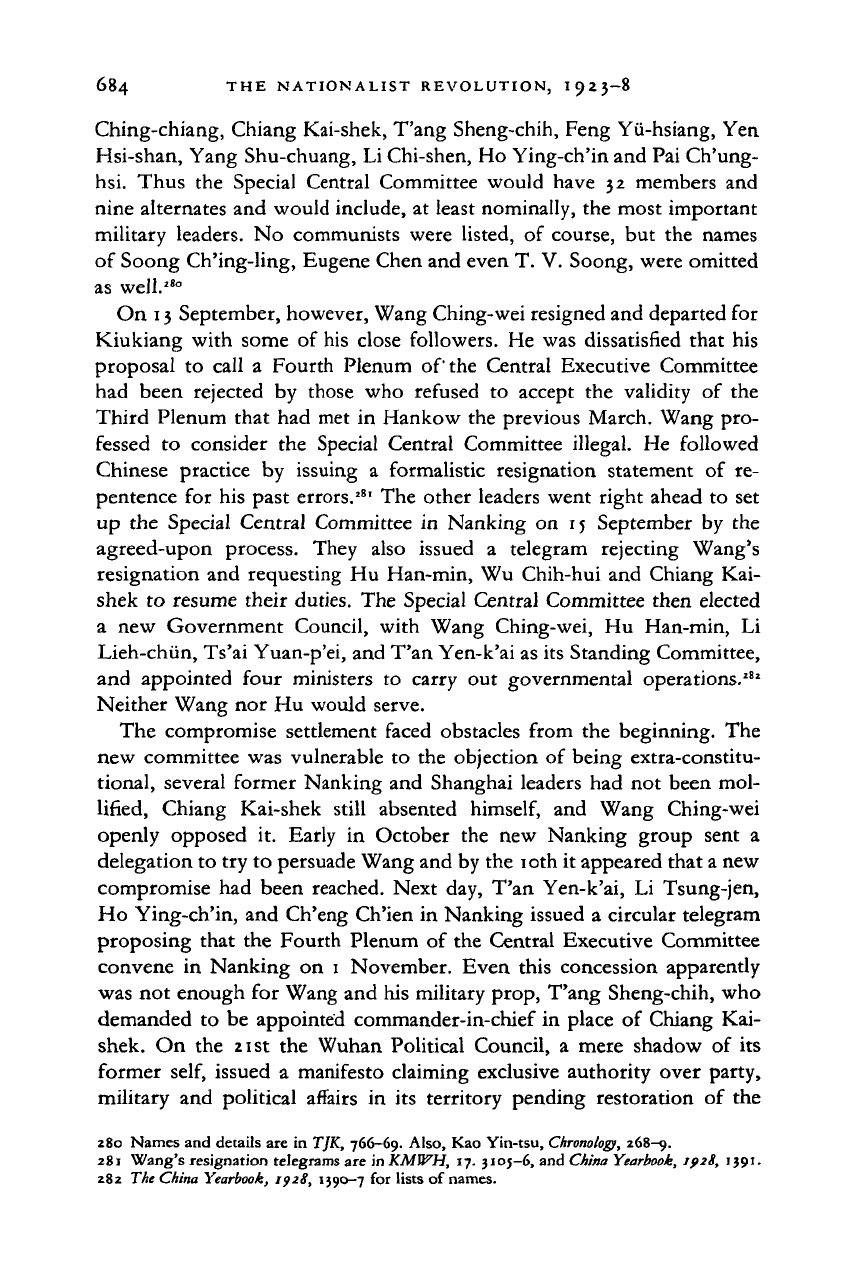
684
THE
NATIONALIST REVOLUTION, I 9 2 3-8
Ching-chiang, Chiang Kai-shek, T'ang Sheng-chih, Feng Yii-hsiang, Yen
Hsi-shan, Yang Shu-chuang, Li Chi-shen, Ho Ying-ch'in and Pai Ch'ung-
hsi.
Thus the Special Central Committee would have 32 members and
nine alternates and would include, at least nominally, the most important
military leaders. No communists were listed, of course, but the names
of Soong Ch'ing-ling, Eugene Chen and even T. V. Soong, were omitted
as well.
280
On 13 September, however, Wang Ching-wei resigned and departed for
Kiukiang with some of his close followers. He was dissatisfied that his
proposal to call a Fourth Plenum of' the Central Executive Committee
had been rejected by those who refused to accept the validity of the
Third Plenum that had met in Hankow the previous March. Wang pro-
fessed to consider the Special Central Committee illegal. He followed
Chinese practice by issuing a formalistic resignation statement of re-
pentence for his past errors.'*' The other leaders went right ahead to set
up the Special Central Committee in Nanking on 15 September by the
agreed-upon process. They also issued a telegram rejecting Wang's
resignation and requesting Hu Han-min, Wu Chih-hui and Chiang Kai-
shek to resume their duties. The Special Central Committee then elected
a new Government Council, with Wang Ching-wei, Hu Han-min, Li
Lieh-chiin, Ts'ai Yuan-p'ei, and T'an Yen-k'ai as its Standing Committee,
and appointed four ministers to carry out governmental operations.
282
Neither Wang nor Hu would serve.
The compromise settlement faced obstacles from the beginning. The
new committee was vulnerable to the objection of being extra-constitu-
tional, several former Nanking and Shanghai leaders had not been mol-
lified, Chiang Kai-shek still absented
himself,
and Wang Ching-wei
openly opposed it. Early in October the new Nanking group sent a
delegation to try to persuade Wang and by the 10th it appeared that a new
compromise had been reached. Next day, T'an Yen-k'ai, Li Tsung-jen,
Ho Ying-ch'in, and Ch'eng Ch'ien in Nanking issued a circular telegram
proposing that the Fourth Plenum of the Central Executive Committee
convene in Nanking on 1 November. Even this concession apparently
was not enough for Wang and his military prop, T'ang Sheng-chih, who
demanded to be appointed commander-in-chief in place of Chiang Kai-
shek. On the 21st the Wuhan Political Council, a mere shadow of its
former
self,
issued a manifesto claiming exclusive authority over party,
military and political affairs in its territory pending restoration of the
280 Names and details are in TJK, 766-69. Also, Kao Yin-tsu,
Chronology,
268-9.
281 Wang's resignation telegrams are in
KMWH,
17. 3105-6, and China
Yearbook,
1928, 1591.
282 The China Yearbook, 1928, 1390—7 for lists of names.
Cambridge Histories Online © Cambridge University Press, 2008
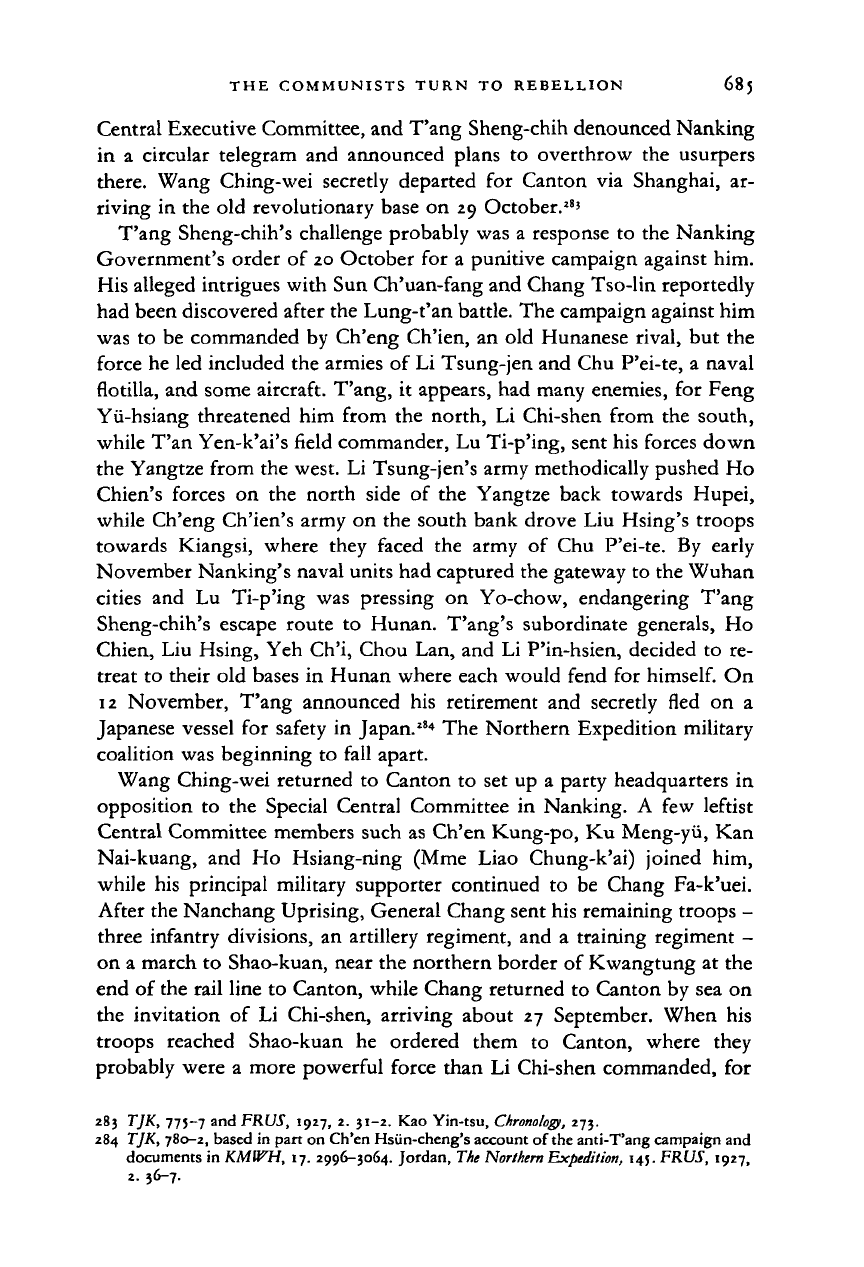
THE COMMUNISTS TURN TO REBELLION 685
Central Executive Committee, and T'ang Sheng-chih denounced Nanking
in a circular telegram and announced plans to overthrow the usurpers
there. Wang Ching-wei secretly departed for Canton via Shanghai, ar-
riving in the old revolutionary base on 29 October.
28
'
T'ang Sheng-chih's challenge probably was a response to the Nanking
Government's order of 20 October for a punitive campaign against him.
His alleged intrigues with Sun Ch'uan-fang and Chang Tso-lin reportedly
had been discovered after the Lung-t'an battle. The campaign against him
was to be commanded by Ch'eng Ch'ien, an old Hunanese rival, but the
force he led included the armies of Li Tsung-jen and Chu P'ei-te, a naval
flotilla, and some aircraft. T'ang, it appears, had many enemies, for Feng
Yii-hsiang threatened him from the north, Li Chi-shen from the south,
while T'an Yen-k'ai's field commander, Lu Ti-p'ing, sent his forces down
the Yangtze from the west. Li Tsung-jen's army methodically pushed Ho
Chien's forces on the north side of the Yangtze back towards Hupei,
while Ch'eng Ch'ien's army on the south bank drove Liu Hsing's troops
towards Kiangsi, where they faced the army of Chu P'ei-te. By early
November Nanking's naval units had captured the gateway to the Wuhan
cities and Lu Ti-p'ing was pressing on Yo-chow, endangering T'ang
Sheng-chih's escape route to Hunan. T'ang's subordinate generals, Ho
Chien, Liu Hsing, Yeh Ch'i, Chou Lan, and Li P'in-hsien, decided to re-
treat to their old bases in Hunan where each would fend for
himself.
On
12 November, T'ang announced his retirement and secretly fled on a
Japanese vessel for safety in Japan.*
84
The Northern Expedition military
coalition was beginning to fall apart.
Wang Ching-wei returned to Canton to set up a party headquarters in
opposition to the Special Central Committee in Nanking. A few leftist
Central Committee members such as Ch'en Kung-po, Ku Meng-yii, Kan
Nai-kuang, and Ho Hsiang-ning (Mme Liao Chung-k'ai) joined him,
while his principal military supporter continued to be Chang Fa-k'uei.
After the Nanchang Uprising, General Chang sent his remaining troops -
three infantry divisions, an artillery regiment, and a training regiment -
on a march to Shao-kuan, near the northern border of Kwangtung at the
end of the rail line to Canton, while Chang returned to Canton by sea on
the invitation of Li Chi-shen, arriving about 27 September. When his
troops reached Shao-kuan he ordered them to Canton, where they
probably were a more powerful force than Li Chi-shen commanded, for
283 TJK, 775-7 and FRUS, 1927, 2. 31-2. Kao Yin-tsu,
Chronology,
273.
284 TJK, 780-2, based in part on Ch'en Hsiin-cheng's account of the anti-T'ang campaign and
documents in
KMIPH,
17. 2996-3064. Jordan, The Northern Expedition, 145. FRUS, 1927,
2.
36-7.
Cambridge Histories Online © Cambridge University Press, 2008

686 THE NATIONALIST REVOLUTION, I 9
2
3-8
Li's troops were spread through the delta towns and he had sent a number
of regiments to the Swatow area to suppress the Ho Lung-Yeh T'ing
incursion. After that successful operation, General Li began bringing
back his troops so that when Wang Ching-wei arrived on 29 October,
the military balance between the two generals seemed approximately
equal. Li Chi-shen's support for Wang was only nominal, for he had close
connections with Huang Shao-hsiung of the Kwangsi clique that sup-
ported the Nanking Special Committee and its government. However, the
campaign against T'ang Sheng-chih had weakened the Kwangsi clique's
hold on Nanking, and the Special Committee itself was in trouble.
28
'
Upon arrival, Wang Ching-wei issued a call for the Fourth Plenum of
the Central Executive Committee to meet in Canton, inviting the mem-
bers in Nanking and Shanghai to attend. Li Chi-shen declined to join in
this call. More telegraphic negotiations with the Nanking leaders ensued,
since they had previously agreed to begin the plenum on 1 November,
but in Nanking. It did not meet, but on that day Wang opened central
Kuomintang headquarters in Canton. The city's leftist labour movement,
which had been severely repressed under Li Chi-shen's anti-communist
regime, showed signs of life after Chang Fa-k'uei and Wang Ching-wei
returned. Several thousand workers carrying red flags marched on Wang's
home, begging him to free labour leaders who had been imprisoned, but
the police dispersed them. An effort to revive the anti-British boycott
may have indicated a communist initiative, for communists had dominated
the old strike committee. Wang's branch political council and the pro-
vincial government arranged to disband the remaining strikers from
Hong Kong with a monetary gift for each.
286
Apparently Wang's faction
was not eager for labour disturbances. As it turned out, Wang's stay in
Canton was only fleeting, for early in November Chiang Kai-shek re-
entered the political arena with a proposal for a Chiang-Wang alliance
against Nanking.
General Chiang had departed for Japan on 28 September where, among
other activities, he won agreement from Mme Soong that he might
marry her youngest daughter, Mei-ling. This would relate him by marriage
with Sun Yat-sen's widow, with T. V. Soong, and with the wife of H. H.
Kung.
28
' He also met privately with the Japanese prime minister, Tanaka
Giichi, on
5
November. Baron Tanaka commended Chiang on his timely
retirement but told him that only he could save the Chinese revolution.
285 Kao Yin-tsu,
Chronology,
269-75. TJK, 777, has Wang arrive in Canton on 28 Oct.
286 Kao Yin-tsu,
Chronology,
14 Oct., 1 and 8 Nov. Also S. Bernard Thomas, 'Proletarian
hegemony'
in the
Chinese revolution
and
the Canton Commune
of 1927, 21.
287 Hollington K. Tong,
Chiang
Kai-shek,
100-1.
The marriage was on 1 December, in both
civil and Christian ceremonies. Later Chiang Kai-shek adopted Christianity.
Cambridge Histories Online © Cambridge University Press, 2008
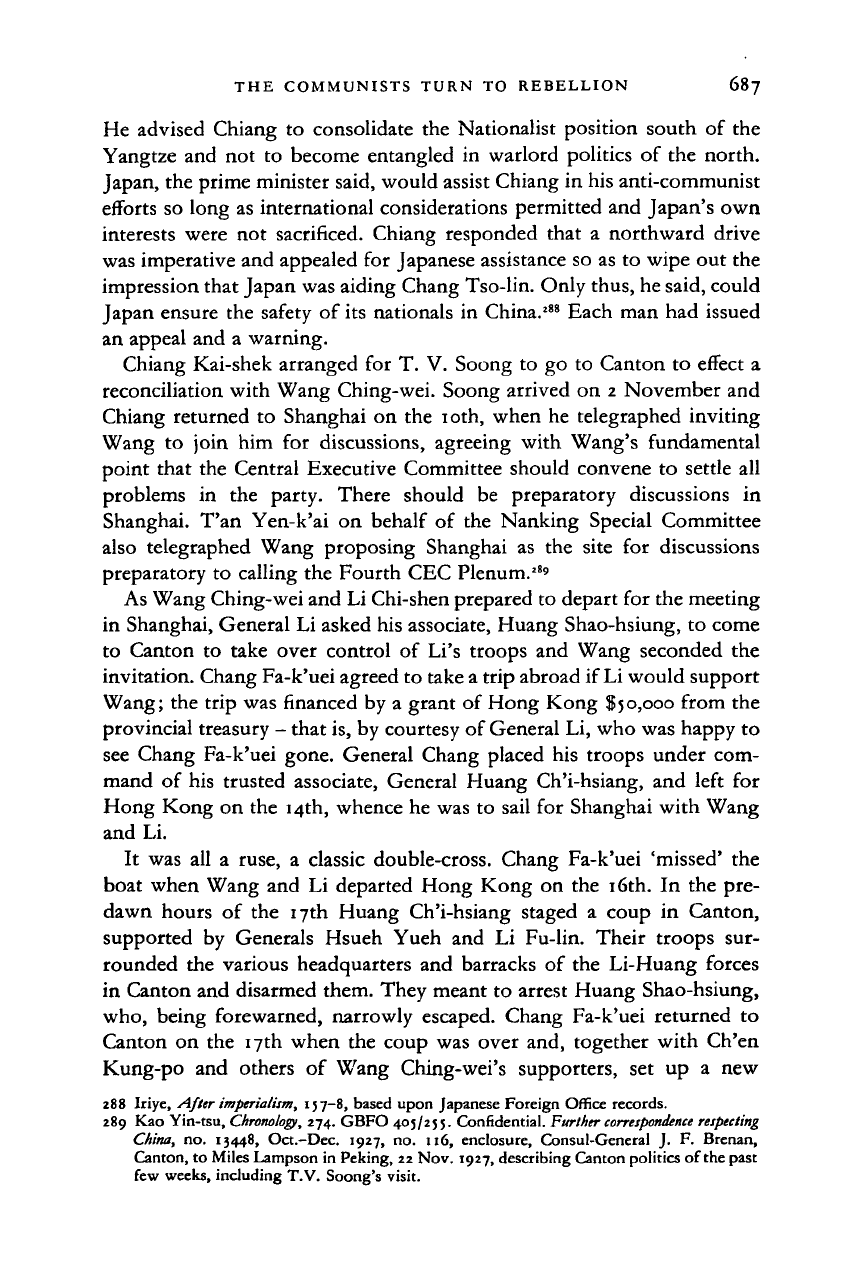
THE COMMUNISTS TURN TO REBELLION 687
He advised Chiang to consolidate the Nationalist position south of the
Yangtze and not to become entangled in warlord politics of the north.
Japan, the prime minister said, would assist Chiang in his anti-communist
efforts so long as international considerations permitted and Japan's own
interests were not sacrificed. Chiang responded that a northward drive
was imperative and appealed for Japanese assistance so as to wipe out the
impression that Japan was aiding Chang Tso-lin. Only thus, he said, could
Japan ensure the safety of its nationals in China.
288
Each man had issued
an appeal and a warning.
Chiang Kai-shek arranged for T. V. Soong to go to Canton to effect a
reconciliation with Wang Ching-wei. Soong arrived on 2 November and
Chiang returned to Shanghai on the 10th, when he telegraphed inviting
Wang to join him for discussions, agreeing with Wang's fundamental
point that the Central Executive Committee should convene to settle all
problems in the party. There should be preparatory discussions in
Shanghai. T'an Yen-k'ai on behalf of the Nanking Special Committee
also telegraphed Wang proposing Shanghai as the site for discussions
preparatory to calling the Fourth CEC Plenum.
28
'
As Wang Ching-wei and Li Chi-shen prepared to depart for the meeting
in Shanghai, General Li asked his associate, Huang Shao-hsiung, to come
to Canton to take over control of Li's troops and Wang seconded the
invitation. Chang Fa-k'uei agreed to take a trip abroad if
Li
would support
Wang; the trip was financed by a grant of Hong Kong $50,000 from the
provincial treasury - that is, by courtesy of General Li, who was happy to
see Chang Fa-k'uei gone. General Chang placed his troops under com-
mand of his trusted associate, General Huang Ch'i-hsiang, and left for
Hong Kong on the 14th, whence he was to sail for Shanghai with Wang
and Li.
It was all a ruse, a classic double-cross. Chang Fa-k'uei 'missed' the
boat when Wang and Li departed Hong Kong on the 16th. In the pre-
dawn hours of the 17th Huang Ch'i-hsiang staged a coup in Canton,
supported by Generals Hsueh Yueh and Li Fu-lin. Their troops sur-
rounded the various headquarters and barracks of the Li-Huang forces
in Canton and disarmed them. They meant to arrest Huang Shao-hsiung,
who,
being forewarned, narrowly escaped. Chang Fa-k'uei returned to
Canton on the 17th when the coup was over and, together with Ch'en
Kung-po and others of Wang Ching-wei's supporters, set up a new
288 Iriye, After
imperialism,
157-8, based upon Japanese Foreign Office records.
289 Kao
Yin-tsu,
Chronology,
274.
GBFO 405/25
5.
Confidential.
Further correspondence respecting
China, no. 13448, Oct.-Dec. 1927, no. 116, enclosure, Consul-General J. F. Brenan,
Canton, to Miles Lampson in Peking, 22 Nov. 1927, describing Canton politics of the past
few weeks, including T.V. Soong's visit.
Cambridge Histories Online © Cambridge University Press, 2008
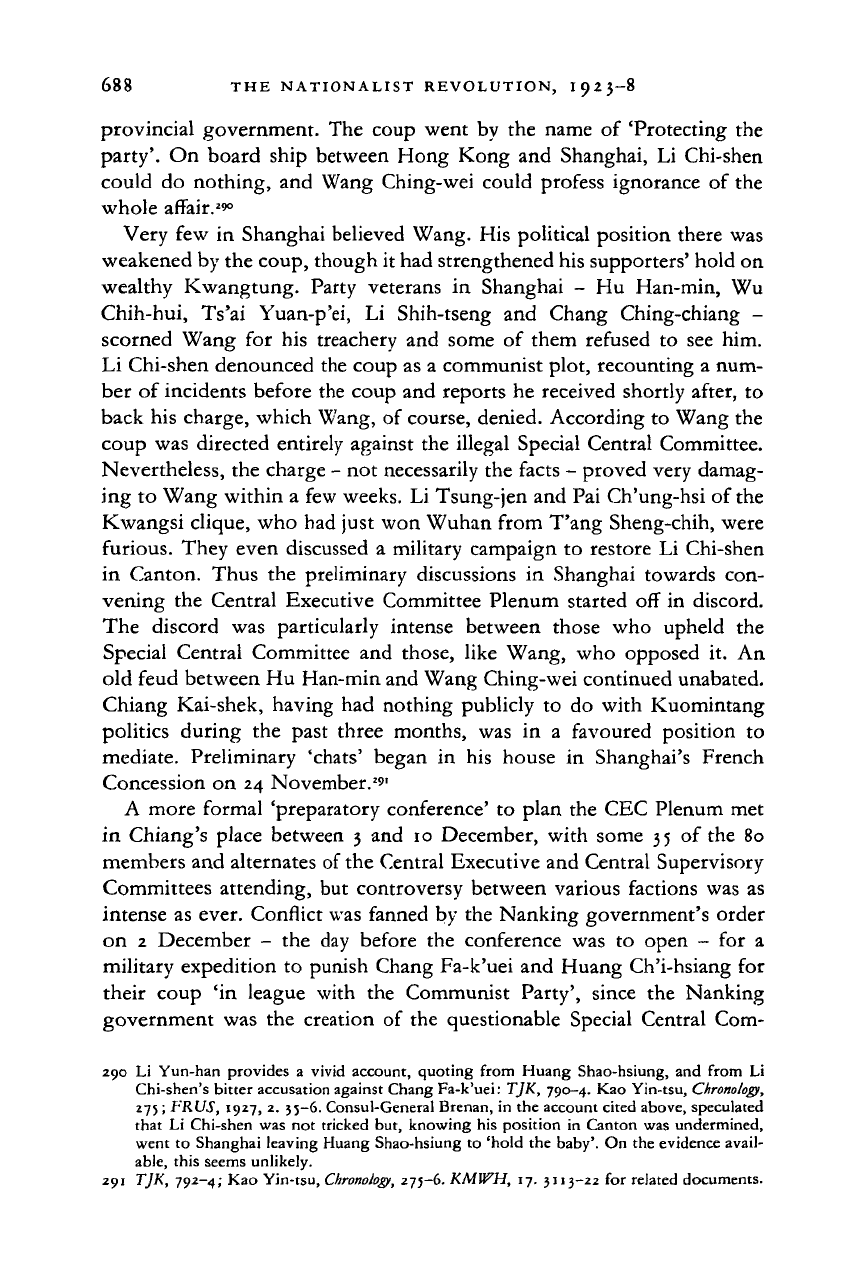
688 THE NATIONALIST REVOLUTION, I 9
2
3-8
provincial government.
The
coup went
by
the
name
of
'Protecting
the
party'.
On
board ship between Hong Kong
and
Shanghai,
Li
Chi-shen
could
do
nothing,
and
Wang Ching-wei could profess ignorance
of
the
whole affair.
2
"
0
Very
few
in
Shanghai believed Wang.
His
political position there
was
weakened
by the
coup, though
it had
strengthened his supporters' hold
on
wealthy Kwangtung. Party veterans
in
Shanghai
- Hu
Han-min,
Wu
Chih-hui, Ts'ai Yuan-p'ei,
Li
Shih-tseng
and
Chang Ching-chiang
-
scorned Wang
for
his
treachery
and
some
of
them refused
to
see him.
Li Chi-shen denounced
the
coup
as
a
communist plot, recounting
a
num-
ber
of
incidents before
the
coup
and
reports
he
received shortly after,
to
back
his
charge, which Wang,
of
course, denied. According
to
Wang
the
coup
was
directed entirely against
the
illegal Special Central Committee.
Nevertheless,
the
charge
-
not
necessarily
the
facts
-
proved very damag-
ing
to
Wang within
a few
weeks.
Li
Tsung-jen
and Pai
Ch'ung-hsi
of
the
Kwangsi clique,
who had
just
won
Wuhan from T'ang Sheng-chih, were
furious. They even discussed
a
military campaign
to
restore
Li
Chi-shen
in Canton. Thus
the
preliminary discussions
in
Shanghai towards
con-
vening
the
Central Executive Committee Plenum started
off in
discord.
The discord
was
particularly intense between those
who
upheld
the
Special Central Committee
and
those, like Wang,
who
opposed
it. An
old feud between
Hu
Han-min
and
Wang Ching-wei continued unabated.
Chiang Kai-shek, having
had
nothing publicly
to do
with Kuomintang
politics during
the
past three months,
was
in a
favoured position
to
mediate. Preliminary 'chats' began
in his
house
in
Shanghai's French
Concession
on 24
November.
2
''
A more formal 'preparatory conference'
to
plan
the CEC
Plenum
met
in Chiang's place between
3 and 10
December, with some
35
of
the 80
members
and
alternates
of
the Central Executive
and
Central Supervisory
Committees attending,
but
controversy between various factions
was
as
intense
as
ever. Conflict was fanned
by the
Nanking government's order
on
2
December
- the
day
before
the
conference
was
to
open
- for a
military expedition
to
punish Chang Fa-k'uei
and
Huang Ch'i-hsiang
for
their coup
'in
league with
the
Communist Party', since
the
Nanking
government
was
the
creation
of
the
questionable Special Central
Com-
290
Li
Yun-han provides
a
vivid account, quoting from Huang Shao-hsiung,
and
from
Li
Chi-shen's bitter accusation against Chang Fa-k'uei: TJK, 790-4. Kao Yin-tsu,
Chrono/ogy,
275;
FRUS, 1927,
2.
35-6. Consul-General Brenan,
in
the account cited above, speculated
that
Li
Chi-shen was
not
tricked but, knowing
his
position
in
Canton was undermined,
went
to
Shanghai leaving Huang Shao-hsiung
to
'hold
the
baby'.
On
the evidence avail-
able,
this seems unlikely.
291 TJK, 792-4; Kao Yin-tsu,
Chronology,
275-6.
KMWH,
17. 3113-22
for
related documents.
Cambridge Histories Online © Cambridge University Press, 2008
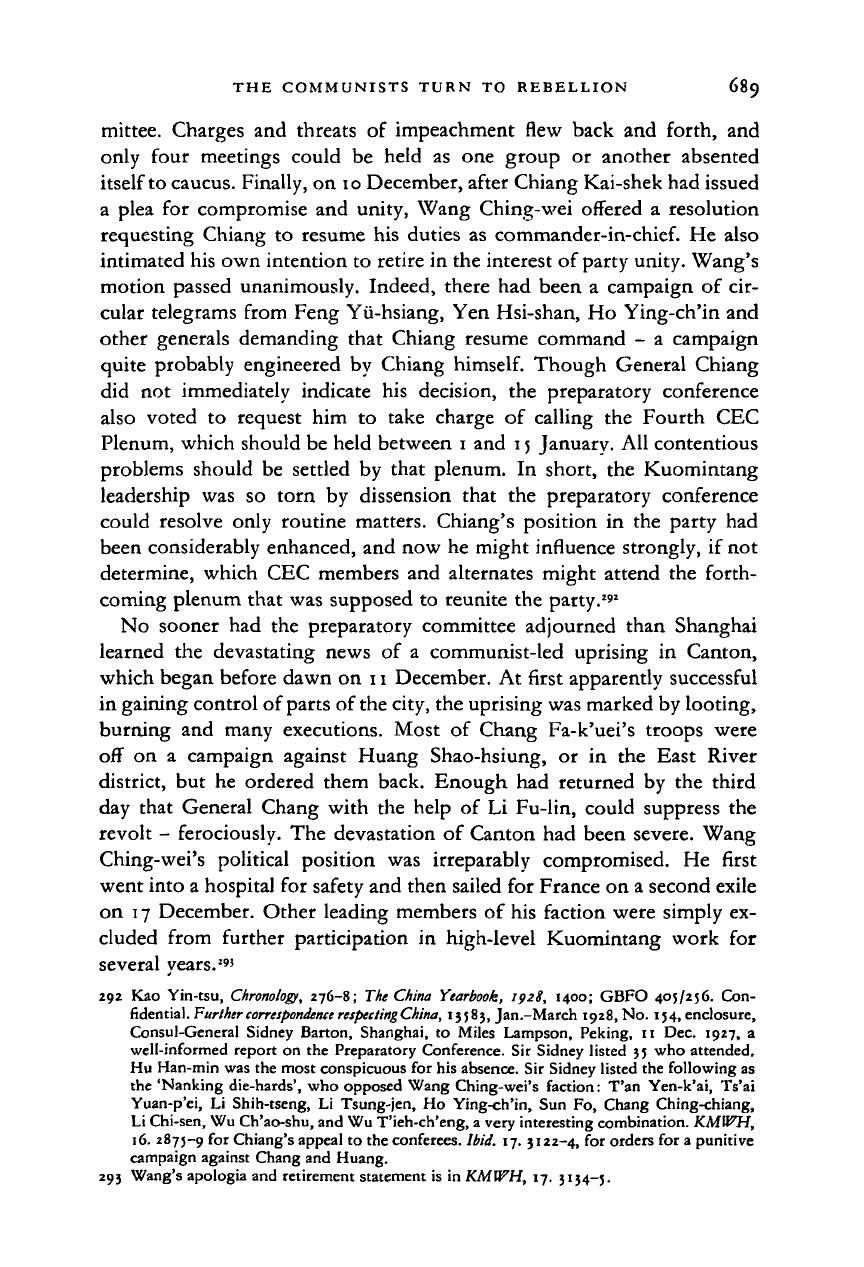
THE COMMUNISTS TURN TO REBELLION 689
mittee. Charges and threats of impeachment flew back and forth, and
only four meetings could be held as one group or another absented
itself to caucus. Finally, on 10 December, after Chiang Kai-shek had issued
a plea for compromise and unity, Wang Ching-wei offered a resolution
requesting Chiang to resume his duties as commander-in-chief. He also
intimated his own intention to retire in the interest of party unity. Wang's
motion passed unanimously. Indeed, there had been a campaign of cir-
cular telegrams from Feng Yii-hsiang, Yen Hsi-shan, Ho Ying-ch'in and
other generals demanding that Chiang resume command - a campaign
quite probably engineered by Chiang
himself.
Though General Chiang
did not immediately indicate his decision, the preparatory conference
also voted to request him to take charge of calling the Fourth CEC
Plenum, which should be held between i and 15 January. All contentious
problems should be settled by that plenum. In short, the Kuomintang
leadership was so torn by dissension that the preparatory conference
could resolve only routine matters. Chiang's position in the party had
been considerably enhanced, and now he might influence strongly, if not
determine, which CEC members and alternates might attend the forth-
coming plenum that was supposed to reunite the party.
2
'
2
No sooner had the preparatory committee adjourned than Shanghai
learned the devastating news of a communist-led uprising in Canton,
which began before dawn on 11 December. At first apparently successful
in gaining control of parts of the city, the uprising was marked by looting,
burning and many executions. Most of Chang Fa-k'uei's troops were
off on a campaign against Huang Shao-hsiung, or in the East River
district, but he ordered them back. Enough had returned by the third
day that General Chang with the help of Li Fu-lin, could suppress the
revolt - ferociously. The devastation of Canton had been severe. Wang
Ching-wei's political position was irreparably compromised. He first
went into a hospital for safety and then sailed for France on a second exile
on 17 December. Other leading members of his faction were simply ex-
cluded from further participation in high-level Kuomintang work for
several years.
2
"
292 Kao Yin-tsu,
Chronology,
276-8; The China Yearbook, 1928, 1400; GBFO 405/256. Con-
fidential.
Further correspondence
respectingChina,
13585, Jan.-March 1928, No. 154, enclosure,
Consul-General Sidney Barton, Shanghai, to Miles Lampson, Peking, 11 Dec. 1927, a
well-informed report on the Preparatory Conference. Sir Sidney listed 55 who attended.
Hu Han-min was the most conspicuous for his absence. Sir Sidney listed the following as
the 'Nanking die-hards', who opposed Wang Ching-wei's faction: T'an Yen-k'ai, Ts'ai
Yuan-p'ei, Li Shih-tseng, Li Tsung-jen, Ho Ying-ch'in, Sun Fo, Chang Ching-chiang,
Li Chi-sen, Wu Ch'ao-shu, and Wu T'ieh-ch'eng, a very interesting combination. KMIPH,
16.
2875-9 f°
r
Chiang's appeal to the conferees.
Ibid.
17. 3122-4, for orders for a punitive
campaign against Chang and Huang.
293 Wang's apologia and retirement statement is in
KMWH,
17. 3134-5.
Cambridge Histories Online © Cambridge University Press, 2008
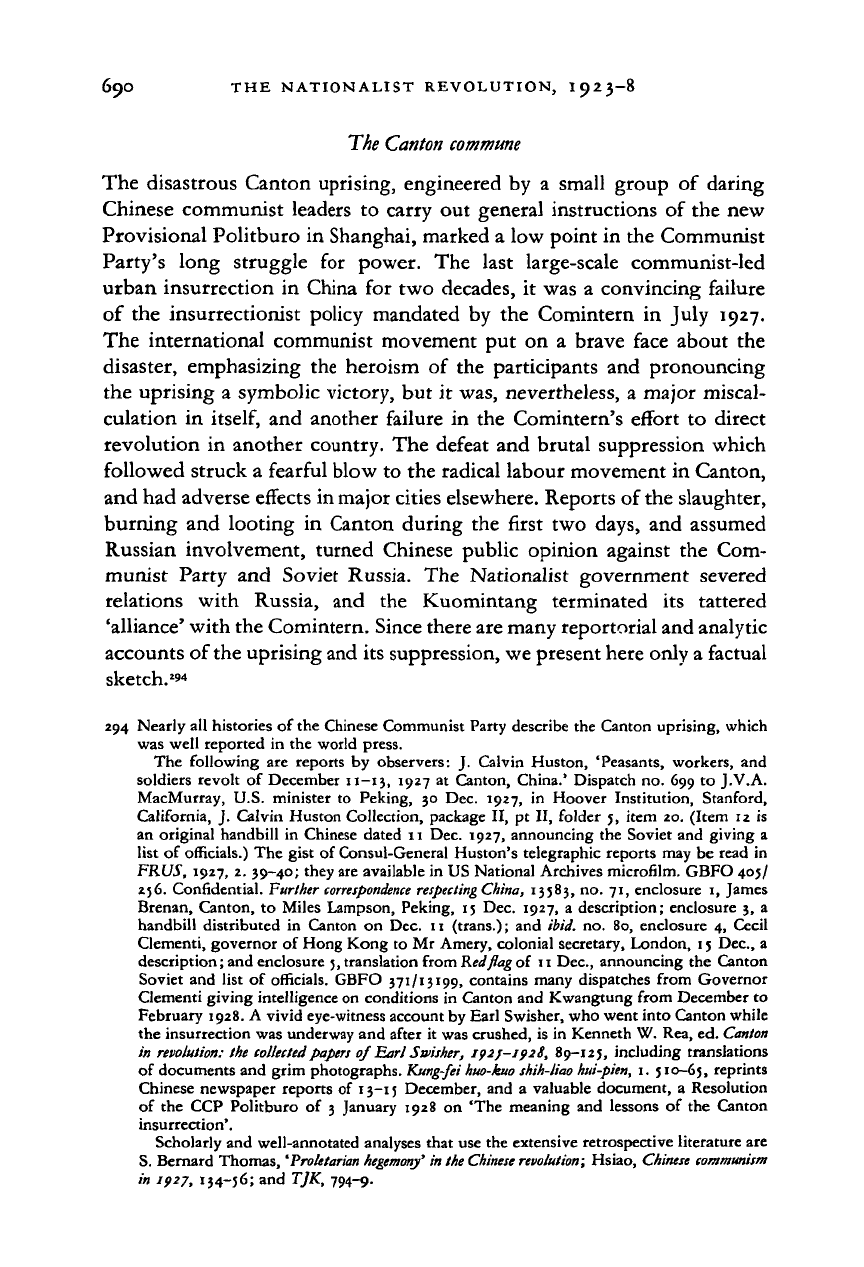
69O THE NATIONALIST REVOLUTION, I923-8
The Canton
commune
The disastrous Canton uprising, engineered
by a
small group
of
daring
Chinese communist leaders
to
carry
out
general instructions
of
the
new
Provisional Politburo
in
Shanghai, marked
a
low point
in
the Communist
Party's long struggle
for
power.
The
last large-scale communist-led
urban insurrection
in
China
for two
decades,
it
was
a
convincing failure
of
the
insurrectionist policy mandated
by the
Comintern
in
July
1927.
The international communist movement
put on a
brave face about
the
disaster, emphasizing
the
heroism
of the
participants
and
pronouncing
the uprising
a
symbolic victory,
but it
was, nevertheless,
a
major miscal-
culation
in
itself,
and
another failure
in the
Comintern's effort
to
direct
revolution
in
another country.
The
defeat
and
brutal suppression which
followed struck
a
fearful blow
to
the radical labour movement
in
Canton,
and had adverse effects in major cities elsewhere. Reports
of
the slaughter,
burning
and
looting
in
Canton during
the
first
two
days,
and
assumed
Russian involvement, turned Chinese public opinion against
the Com-
munist Party
and
Soviet Russia.
The
Nationalist government severed
relations with Russia,
and the
Kuomintang terminated
its
tattered
'alliance' with the Comintern. Since there are many reportorial and analytic
accounts of the uprising and its suppression, we present here only
a
factual
sketch.
2
'
4
294 Nearly all histories
of
the Chinese Communist Party describe the Canton uprising, which
was well reported
in
the world press.
The following
are
reports
by
observers:
J.
Calvin Huston, 'Peasants, workers,
and
soldiers revolt
of
December
II-IJ,
1927
at
Canton, China." Dispatch no. 699
to
J.V.A.
MacMurray,
U.S.
minister
to
Peking,
30
Dec. 1927,
in
Hoover Institution, Stanford,
California,
J.
Calvin Huston Collection, package II,
pt
II, folder
5,
item 20. (Item 12
is
an original handbill
in
Chinese dated 11 Dec. 1927, announcing
the
Soviet and giving
a
list
of
officials.) The gist
of
Consul-General Huston's telegraphic reports may
be
read
in
FRVS, 1927, 2. 39-40; they are available in US National Archives microfilm. GBFO 405/
256.
Confidential.
Further correspondence respecting
China,
13583, no. 71, enclosure
i,
James
Brenan, Canton,
to
Miles Lampson, Peking,
15
Dec. 1927,
a
description; enclosure 3,
a
handbill distributed
in
Canton
on
Dec.
11
(trans.);
and
ibid.
no.
80, enclosure
4,
Cecil
Clementi, governor
of
Hong Kong
to
Mr Amery, colonial secretary, London,
1 5
Dec,
a
description; and enclosure
5,
translation from
Kedflag
of
11
Dec, announcing
the
Canton
Soviet
and
list
of
officials. GBFO 371/13199, contains many dispatches from Governor
Clementi giving intelligence on conditions
in
Canton and Kwangtung from December
to
February
1928.
A vivid eye-witness account by Earl Swisher, who went into Canton while
the insurrection was underway and after
it
was crushed,
is in
Kenneth W. Rea, ed.
Canton
in
revolution:
the
collected
papers
0/
Earl S
wisher,
192J—1928,
89-125, including translations
of documents and grim photographs.
Kung-fei huo-kuo shih-liao
hui-pien,
1.
510-65, reprints
Chinese newspaper reports
of
13-15 December,
and a
valuable document,
a
Resolution
of
the
CCP Politburo
of
3 January 1928
on 'The
meaning
and
lessons
of the
Canton
insurrection'.
Scholarly and well-annotated analyses that use the extensive retrospective literature are
S.
Bernard
Thomas,
'Proletarian
hegemony'
in the
Chinese
revolution;
Hsiao,
Chinese
communism
in
1927,
134-56; and TJK, 794-9.
Cambridge Histories Online © Cambridge University Press, 2008

THE COMMUNISTS TURN TO REBELLION 691
The Communist Party's Provisional Politburo held an enlarged meeting
in Shanghai on 10 and u November to assess the recent defeats and
develop plans to rebuild the party. To 'start on the path of true revolu-
tionary bolshevik struggle', it laid down a general strategy for revolu-
tion,
29i
after which plans for an insurrection in Kwangtung were worked
out with Chang T'ai-lei, secretary of the Kwangtung Provincial Com-
mittee. News of Huang Ch'i-hsiang's coup against Huang Shao-hsiung in
Canton on 17 November, made it seem likely there would soon be con-
flict between the armies of Chang Fa-k'uei and Li Chi-shen. To take
advantage of this opportunity, the Politburo issued an 11-point pro-
gramme on 18 November, which instructed the Kwangtung communists
to unleash peasant insurrections in the countryside, worker uprisings in
county centres, a general political. strike in Canton, and military mu-
tinies.
2
'
6
On 26 November the Kwangtung Provincial Committee resolved
to stage an insurrection and appointed a five-man Revolutionary Military
Council, with Chang T'ai-lei as chairman and Yeh T'ing as commander-
in-chief.
The council developed a political programme, began military
preparations, selected officers for a soviet, mobilized workers in the
remaining red unions, secretly recruited among the troops, and tried to
establish contacts with nearby peasant movements. On 7 December the
Kwangtung Provincial Committee secretly convened a meeting in Canton
that was called a 'worker-peasant-soldier congress', and this adopted a
soviet of 15 deputies, of whom nine were listed as workers and three
each as peasants and soldiers, though the Provincial Committee later
admitted that all were intellectuals. This meeting picked 13 December
as the date for the Canton uprising.
2
'
7
By then the Revolutionary Military Council had considerable resources.
The cadet Training Regiment, which Chang Fa-k'uei had brought from
Wuhan where its men had been under the influence of Yun Tai-ying,
had some communist officers and Yeh Chien-ying was its deputy com-
mander. The council had organized a Red Guard made up of about 500
former strike pickets from the Hong Kong-Canton strike organization
and some 1,500 workers from unions still under communist leadership.
There were also some communists among the cadets at the Whampoa
Academy. The main difficulty was a shortage of
arms.
Canton was lightly
protected in early December, since Chang Fa-k'uei had sent most of his
troops out of the city to ward off the forces of Huang Shao-hsiung and
295 The plan appeared as 'Central announcement number i6", dated 18 Nov, in
Chung-yang
t'ung-hsun,
IJ,
(jo Nov. 1927), 1-6.
296 Thomas,
'Proletarian
hegemony'
in
the Chinese
revolution,
21-2.
297
Ibid.
23.
Cambridge Histories Online © Cambridge University Press, 2008
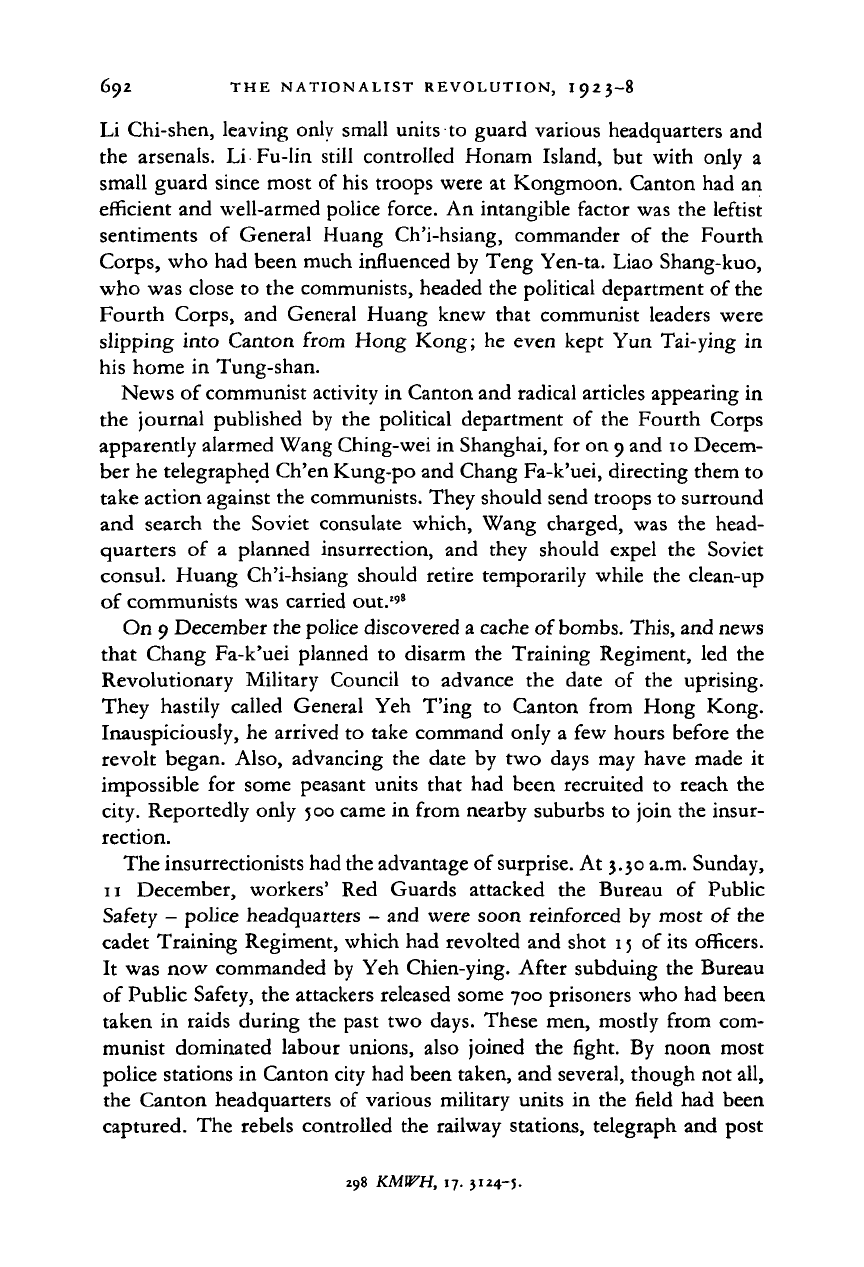
692 THE NATIONALIST REVOLUTION, I923-8
Li Chi-shen, leaving only small units
to
guard various headquarters and
the arsenals.
Li
Fu-lin still controlled Honam Island,
but
with only
a
small guard since most of his troops were
at
Kongmoon. Canton had an
efficient and well-armed police force. An intangible factor was the leftist
sentiments
of
General Huang Ch'i-hsiang, commander
of the
Fourth
Corps, who had been much influenced by Teng Yen-ta. Liao Shang-kuo,
who was close to the communists, headed the political department of the
Fourth Corps,
and
General Huang knew that communist leaders were
slipping into Canton from Hong Kong;
he
even kept Yun Tai-ying
in
his home
in
Tung-shan.
News of communist activity in Canton and radical articles appearing in
the journal published
by the
political department
of
the Fourth Corps
apparently alarmed Wang Ching-wei in Shanghai, for on 9 and 10 Decem-
ber he telegraphed Ch'en Kung-po and Chang Fa-k'uei, directing them to
take action against the communists. They should send troops to surround
and search
the
Soviet consulate which, Wang charged, was
the
head-
quarters
of a
planned insurrection,
and
they should expel
the
Soviet
consul. Huang Ch'i-hsiang should retire temporarily while the clean-up
of communists was carried out.
2
'
8
On 9 December the police discovered a cache of
bombs.
This, and news
that Chang Fa-k'uei planned
to
disarm
the
Training Regiment,
led the
Revolutionary Military Council
to
advance
the
date
of the
uprising.
They hastily called General
Yeh
T'ing
to
Canton from Hong Kong.
Inauspiciously, he arrived to take command only
a
few hours before the
revolt began. Also, advancing
the
date
by
two days may have made
it
impossible
for
some peasant units that had been recruited
to
reach the
city. Reportedly only 500 came in from nearby suburbs to join the insur-
rection.
The insurrectionists had the advantage of
surprise.
At $.30 a.m. Sunday,
11 December, workers'
Red
Guards attacked
the
Bureau
of
Public
Safety
—
police headquarters
-
and were soon reinforced by most
of
the
cadet Training Regiment, which had revolted and shot 15 of its officers.
It was now commanded by Yeh Chien-ying. After subduing the Bureau
of Public Safety, the attackers released some 700 prisoners who had been
taken
in
raids during the past two days. These men, mostly from com-
munist dominated labour unions, also joined
the
fight.
By
noon most
police stations in Canton city had been taken, and several, though not all,
the Canton headquarters
of
various military units
in
the field had been
captured. The rebels controlled the railway stations, telegraph and post
298
KMiPH,
17. 3124-5.
Cambridge Histories Online © Cambridge University Press, 2008
